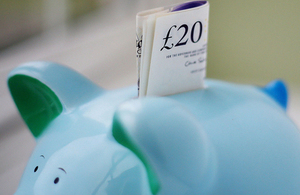10 ways to save money in 2016
Is sorting out your finances top of your new year’s resolution list? Here’s a few ways the government can help to get you started in 2016.

1. If you’re saving for a deposit for your first home, you can earn a bonus with the Help to Buy: ISA
If you’re saving to buy your first home, you can put away up to £200 a month in the Help to Buy: ISA and the government will top it up by 25%, up to a maximum of £3,000.
This year, if you put away £3400 in your Help to Buy: ISA, your bonus will be £850 in December (save £1,200 in January and £200 every month after that).
You can take a Help to Buy: ISA out with one of 14 providers.
2. Switching your bank account could save you on average £70 a year
It’s a quick and easy way to switch your current account in 7 days – your direct debits and standing orders are transferred automatically, and there’s a switch guarantee, so you’re protected against financial loss if anything goes wrong when you switch.
Over 2.25 million switches have taken place since 2013. And it’s also available to 99% of small businesses.
3. There are more options for how to manage your pension
Since 6 April 2015, if you’re aged 55 and above, you can access your savings from your defined contributions pension scheme to invest or spend as you want under new pension reforms.
For example, you can take money direct from your pension pot without having to buy an annuity or put the money into drawdown, and 25% of this sum will be tax free - or you can use some or all of your funds to buy an annuity that will be payable for at least the rest of your life.
The government’s Pension Wise service can provide more guidance.
4. If you’re looking to buy a new build home you could benefit from the Help to Buy scheme
With the Help to Buy: Equity Loan scheme, if you’re able to put down at least a 5% deposit, the government will lend you up to 20% of the rest of the value of the property, alongside your mortgage of up to 75%.
And to reflect the current property market in London, those buying in Greater London will soon be able to benefit from up to a 40% loan.
Alternatively, from April 2016, if you have a household income of less than £80,000 outside London, and £90,000 inside London, Help to Buy Shared Ownership will allow you to buy a share of between 25% and 75% of a home.
The rent on the rest of the property won’t be more than 3% of the amount left and the scheme will apply across England.
5. Married couples could save up to £212 this year by applying for the marriage allowance
The Marriage Allowance lets you transfer £1,060 of your Personal Allowance to your husband, wife or civil partner.
This means that they could pay up to £212 less tax this tax year (from April 2015 to April 2016).
6. You can use an online tool to find out if you’re getting the best deal from your current account
Using the Midata tool on GoCompare, you can compare current accounts to find out the best one for you, based on how you actually use your bank account.
The service was set-up in April 2015 to help you get easy access to your data so you can make choices about how you bank.
At the moment, you can use the service if you bank with any of these providers – HSBC, Lloyds, RBS, Barclays, Nationwide, Santander and Tesco Bank. You can download your midata file through internet banking.
7. You will have complete freedom to take money out of an ISA and put it back in later in the year
ISAs are being reformed so that instead of being able to put up to £15,240 in the 2015-16 tax year into an ISA in total, you can take out your money and put it back in within the same year, without losing your ISA tax benefits - as long as the repayment is made in the same tax year as the withdrawal.
8. Taking out a mortgage is becoming simpler
Which? and the Council of Mortgage Lenders have standardised and simplified mortgage fees, so that the fees you’re charged when you take out a mortgage are clearer.
Lenders have committed to use the same names for fees, so that you only have to get your head round the different types of fees, rather than the different names.
All fees will also have the same fee descriptions, listed in the same order. So when it comes to deciding which mortgage is right for you, it’ll be easier to compare.
9. From April 2016, a new Personal Savings Allowance will take 95% of taxpayers out of savings tax altogether
From April 2016, a tax-free allowance of £1,000 (or £500 for higher rate taxpayers) will be introduced for the interest that you earn on your savings.
If you are a basic rate taxpayer (you have a total income of up to £43,000 in 2016-17), you will be eligible for a £1,000 tax-free savings allowance.
If you are a higher rate taxpayer (you have a total income in 2016-17 between £43,001 and £150,000), you will be eligible for a £500 tax-free savings allowance.
10. The tax-free Personal Allowance will be increased from £10,600 in 2015-16 to £11,000 in April 2016
The tax-free Personal Allowance – the amount people earn before they have to start paying Income Tax – will increase to £11,000 in 2016-17.
This means that a typical taxpayer will be £80 better off in 2016-17 than they were in 2015-16.